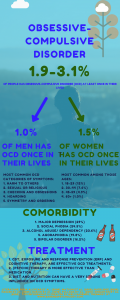OCD Test – Obsessive-compulsive disorder test.
This OCD test is not made for diagnostic purposes. The test can be used to see whether or not you or your friend may meet the criteria for obsessive-compulsive disorder. Sometimes you may think you suffer OCD, but in reality, you don’t. In other cases, people deny having OCD, but suffer a lot from its symptoms. A problem with OCD is that it doesn’t go away by itself. You may try to avoid OCD-triggers, but the obsessions/compulsions will stay unless treated. It is therefore likely that you will not only continue to suffer with your OCD, but actually get worse over time. So, use this OCD test wisely and contact a professional for help if the test results show you may suffer OCD.
After filling in the OCD quiz you will see your score and what the score represents. The OCD test is anonymous and takes only 5 minutes of your time.
Scroll down to take the quiz immediately.
Someone can develop OCD after experiencing a traumatic event, due to neuro-biological issues or family genetics. OCD is a progressive mental illness, meaning that it often starts out with simple, inoffensive behaviours, that spiral into obsessive or compulsive rituals over time.
The symptoms of OCD can lead to other mental illnesses, such as depression, so it is vital that if you believe you are developing OCD symptoms, to seek mental health care as soon as possible.
Jump to:
- What is obsessive-compulsive disorder, and what are its symptoms?
- OCD causes.
- Diagnosing OCD.
- Obsessive-compulsive disorder treatment options.
- Coping with OCD yourself.
- Living with someone who has OCD.
- Interesting OCD facts.
- Online counseling for OCD.
- Take me to the homepage.
At Barends Psychology Practice obsessive-compulsive disorder treatment is offered (also online). Go to contact us to schedule a first, free of charge, first session. (Depending on your health insurance, treatment may be reimbursed).
(Advertisement. For more information, please scroll down.)


